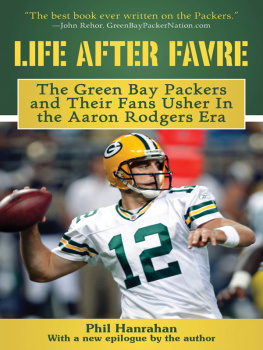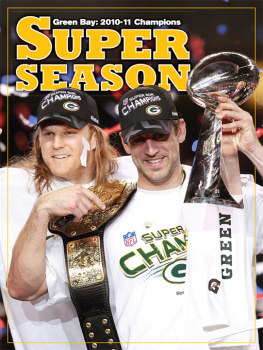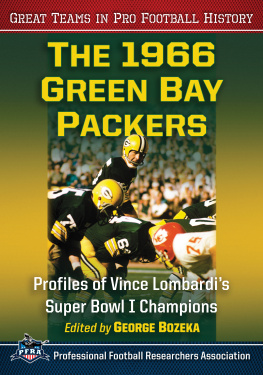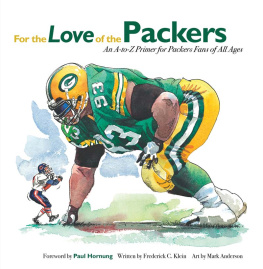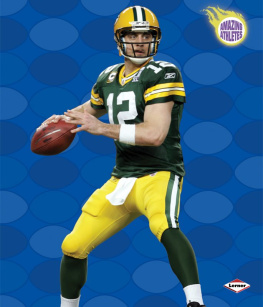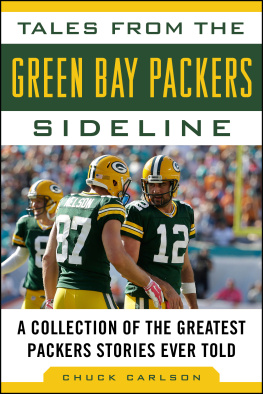Copyright 2013 by Donald Driver
All rights reserved.
Published in the United States by Crown Archetype,
an imprint of the Crown Publishing Group,
a division of Random House LLC, New York,
a Penguin Random House Company.
www.crownpublishing.com
Crown Archetype with colophon is a trademark of Random House LLC.
Library of Congress Cataloging-in-Publication Data
Driver, Donald
Driven: from homeless to hero, my journeys on and off Lambeau Field/Donald Driver.
pages cm.
1. Driver, Donald, 1975. 2. Football playersUnited
StatesBiography. I. Title.
GV939.D78A3 2013
796.332092dc23
[B] 2013022761
ISBN 978-0-385-34914-7
eISBN: 978-0-385-34915-4
Jacket design by Michael Nagin
Jacket photographs: Scott McDermott
v3.1
To my beautiful wife, Betina,
my son, Cristian,
and my two daughters, Christina and Charity
CONTENTS
PREFACE
A DVERSITY CAN WRECK your life. Adversity can lay you so low that you never recover. But if you stand up to adversity, it can also make you stronger, wiser, and more compassionate. If you get nothing else out of reading my story, you will come to understand that no matter what your background, no matter what your family life is like, and no matter what obstacles are thrown your way, if you have someone who loves you and looks out for you and if you have a mind to succeed, then anything is possible.
I, Donald Driver, am living proof of that.
For fourteen wonderful years I was a member of the Green Bay Packers football team. I was the teammate of players such as Brett Favre, Desmond Howard, and Aaron Rodgers. After several heartbreaking near misses, painful for me in the retelling, I was blessed to be a member of the 2010 Super Bowlwinning team, and I have to say that earning that ring was one of the highlights of my life. Millions of people watch the Super Bowl on TV, but few truly understand how hard it is to get there and how special it feels to be playing in that game.
In addition to earning that ring, through hard work and a little luck I was able to become the leading receiver in Packers history in catches with 743 and yards gained with 10,137. The luck was staying away from serious injury, as I was able to play in 205 games, second-most in Packer history after Brett Favre.
I also had the privilege of participating in the reality show Dancing with the Stars. I became the third NFL football player to win the contest and the Mirror Bowl, which meant almost as much to me as winning the Super Bowl. The preparation was grueling, as you will see.
Its been quite a ride.
Looking back I would constantly ask myself, How did this African American kid growing up on the mean streets of Houston do it?
The answer lies between the covers of this book.
As a teenager I had little stability as my family moved from place to place. When things got really bad we lived in a U-Haul under a bridge for several months, cooking meals on a hibachi. Father figures drifted in and out of my life, and I had a mom who worked at night, leaving my brother and me to our own devices.
The way I started out in life, dealing drugs and stealing cars, its quite possible that if events had occurred differently, I could have ended up in jail, or worse, six feet under. When I decided to write this book, I did it because I wanted peopleespecially young peopleto know that we all make mistakes in life and, more important, we can overcome them.
I was fortunate. Unlike many of my relatives and friends who grew up with me in Houstons ghetto, I had a talent I could use to escape my hardscrabble, street-kid youth. I had a mother who loved me and grandparents who supported me, and after I left Houston to go to college, I met a woman who helped me to find a more righteous path in life. Thanks to my wife, Tina, I became successful and right-minded.
You know of my toughness and my smile. Now youll know why I pick up after myself in hotel rooms, why my mother is a hero, and why my wife is my strength. Youll know why I make my family wear seat belts, and why I am devoted to the Packers fans who always believed in me.
I am proud of the receptions and the touchdowns, but I am prouder of the family I am raising and the charity work I do. I am most proud of being a doting husband and a proud papa.
This is my real story. It isnt a story invented to make me look good. Ive decided to let you readers come with me every step of the way on my journey of lifesmiling through it all.
CHAPTER 1
CHILD
OF THE
HOOD
M Y DAD , M ARVIN D RIVER J R. , it has been said to me many times, was one of the best quarterbacks ever to come out of Texas high school football. He was the starting quarterback his freshman year at Drew High School in Crosby, Texas, a town about thirty-five miles northeast of Houston. My dad could throw the ball seventy-eight yards in the air. The legend is that he kicked a football from a tee from one end zone to the other barefoot in the winter. I suspect that was how he earned the nickname Steel-Toe.
Time brought change to Texas. After Brown v. Board of Education, integration became mandatory, and race relations in the South turned really ugly. Drew High School, where my mom as well as dad went to school, was all black, and Crosby High School was all white. When the courts ordered the integration of Crosby High, the whites rioted.
At that point all the black players decided they didnt want to play with the white boys, and they quit the teamall except my dad, whose father told him, Were not quitters. Were going to fight this, and youre going to play football.
Dad said he was stunned by what happened next: Most of the hatred toward him came not from the whites but from people of his own race. He was called whitey lover, and one day he opened up his locker and was horrified to see a stuffed monkey hanging with a rope around its neck with a sign that said, Quit nigger or youll wish you had.
My dad, scared, went home and told his father what happened.
Stay strong, his father advised him.
My dad stayed on the football team, even though the white coaches made him backup behind a less talented white quarterback.
Sports often is an antidote to prejudice and racism. Coaches and fans want to win, and, even in the 1960s, if the white guy couldnt do the job, to save his own job a white coach would put in the more talented black player. Once a player can help a coach win, the color of the players skin no longer matters.
The Crosby Cougars football team wasnt doing very well under their white quarterback, and so as a last resort the coach put my dad in, and my dad brought the team victories.
As my father tells the story, the crowd would yell, We want Driver! We want Driver!
He told me, It gave everyone, including me, goose bumps.
(To show how times have changed, I never oncenot in high school or in collegefelt the sting of racism.)
My dad became the captain of the Crosby Cougars, and he was recruited and given a scholarship to Texas A&M, but he never went because life threw him for a big loss when his father died unexpectedly his senior year.
My father was the eldest of ten children, and he felt the pressure of suddenly having to be the breadwinner of the family. With his fathers income gone, his mother, Betty, had to raise ten children by herself. Money was very hard to come by.


